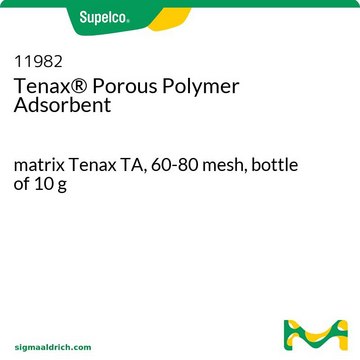推薦產品
product name
Carbopack®吸附剂, matrix Carboxen® 569, 20-45 mesh, bottle of 500 g
產品線
Carboxen®
品質等級
形狀
powder
包裝
bottle of 500 g
技術
LPLC: suitable
表面積
~485 m2/g
基質
Carboxen® 569
基質活性組
carbon
粒徑
20-45 mesh
孔徑
~0.10 cm3/g macroporosity
~0.14 cm3/g mesoporosity
~0.20 cm3/g microporosity
~5-8 Å pore diameter
密度
~0.61 g/mL (free fall density)
分離技術
reversed phase
尋找類似的產品? 前往 產品比較指南
一般說明
應用
特點和優勢
- 球形
- 坚硬,球盘硬度>98%
- 温度稳定性高达400°C
- 高纯度
- 易于填料
- 全pH范围下稳定
- 不产生背压
- 渗透压冲击稳定性高
- 渐变式孔径(从大孔到中孔再到微孔)
其他說明
法律資訊
儲存類別代碼
11 - Combustible Solids
水污染物質分類(WGK)
nwg
閃點(°F)
Not applicable
閃點(°C)
Not applicable
個人防護裝備
Eyeshields, Gloves, type N95 (US)
客戶也查看了
文章
Carbon Molecular sieves (CMS) are a versatile range of adsorbents that can be tailored for specific applications. Supelco® scientists have been synthesizing synthetic CMS carbons for several decades, starting from tailoring of the starting polymers/copolymers, to modifying the final properties of the subsequent CMS carbon.
Carbon Molecular sieves (CMS) are a versatile range of adsorbents that can be tailored for specific applications. Supelco® scientists have been synthesizing synthetic CMS carbons for several decades, starting from tailoring of the starting polymers/copolymers, to modifying the final properties of the subsequent CMS carbon.
我們的科學家團隊在所有研究領域都有豐富的經驗,包括生命科學、材料科學、化學合成、色譜、分析等.
聯絡技術服務










